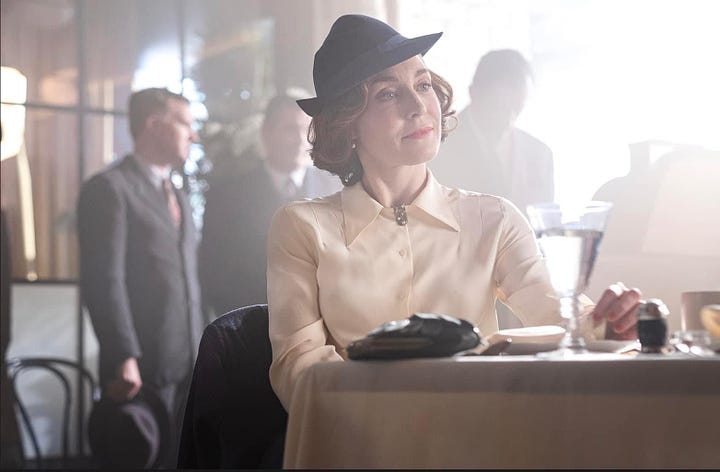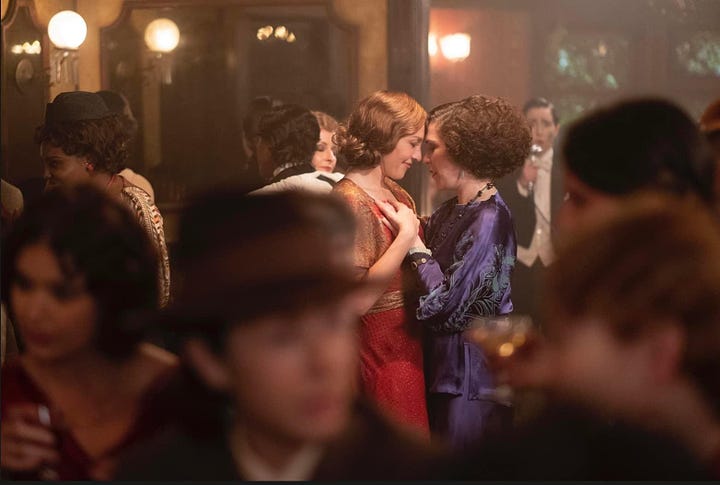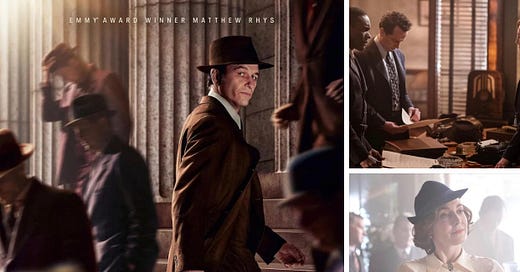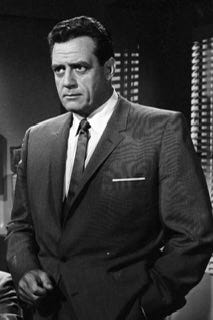“Perry Mason” Reboot: Breaking the Mold (First Season)
Join me as I follow some of my favorite shows this season! “Perry Mason,” “Succession” and more to come. Please share your views and make this a community affair!
“Perry Mason” draws its name and the bold caps typescript of its opening from the 1957 series. Back then, it seemed realistic, even gritty. We loved watching Raymond Burr as Perry, stern and patriarchal in his well-appointed mid-century-modern offices, masterful on the stand, win the day for justice.
We didn’t know that Burr was in fact a closeted gay man, and the writers probably didn’t realize that Barbara Hale, his girl Friday (spunky and smart, though mostly silent) provided a glimmer of working-girl independence that foretold the coming of Women’s Lib. This was a generation of viewers that had witnessed Joseph Welch’s takedown of Joseph McCarthy during televised hearings, but had yet to see the flowering of women’s rebellion against their expected role of “silent mainstay of a male hero.”
We were on the cusp of a period of enormous social change. Not quite there yet – but we believed in its possibility.
The 2020 series, in contrast, arrived as we were slogging through the anxiety and boredom of an unending pandemic. We were appalled and exhausted by the constant stream of ugliness in our politics, by the Trump administration’s limitless incompetence, crudeness, sexism and racism, and tired of waiting for good news, any good news, to bring a moment of relief from three years of living under a President who seems to many Americans to get away with…well, everything.
We took our antidotes where we could find them. And many of us – particularly younger viewers, who were among those who watched the series in huge numbers digitally – fell in love with this new Perry Mason, with its depleted, emotionally raw Perry (Matthew Rhys), so different from the robust, commanding Burr of the original show – which ran until 1965 – and its grim 1930s social landscape of haves and have-nots.
This “Perry Mason,” for many, was an implicit rebuke to Donald Trump’s mythical “great” American past, fantasized, by him and his followers, as intact and thriving before immigrants, Black activists and feminists invaded.
The claustrophobic atmosphere of the reboot, relieved only by brief glimpses of Perry’s farm and a one-time plane trip with his aviator landlady Lupe (Veronica Falcon), was as airless as an existence shut-in by Covid-19. Every character wore a suffocating mask of one sort or another. It might be hidden sexuality, it might be Perry’s glimpsed but never-discussed PTSD, it might be evangelist Sister Alice’s (Tatiana Maslany) history of abuse (when she takes off her blonde wig at the end, she looks like a totally different person).
Everyone in the first season of the reboot was in some way closeted, inhibited by social conventions from revealing important parts of their history or identity, and suffering because of it. The series was a fiction that felt more real in 2020 than either the original show (whose “signature” episode ending involved a confession that turns everything around) or the horrifying reality show called the Trump administration, which had turned “justice” into an unfulfilled (still!!) fantasy.
But as much as the season was a dark mirror on a mythologized past and a depressing present, it was full of unexpected pleasures.
We may not realize how many cliches and overdone tropes we’ve been subjected to until they break the mold. Throughout the first season, the rough-hewn Mason is schooled by Della Street (Juliet Rylance) in lawyerly strategy, good manners, and the ways of friendship (when he apologizes for a piggish comment about her girlfriend, she forgives him for behaving “abominably”) and both Della and Lupe refuse to give up their ground to him, despite their affection for him.
Lupe, a self-described, no-nonsense “businesswoman,” has her eye on Perry’s farm for her airfield enterprise; despite that, she and Perry are pals and sometimes sex-buddies. It’s because of Lupe that I first became attached to the show. She is about as far from Rhys’ last TV romantic partner – the blonde, delicately featured Keri Russell in “The Americans” – as is imaginable.
Lupe’s body is thick, she’s undeniably sexy but not “pretty” – not by symmetrical, American Beauty standards – and in an earlier decade she would probably be cast, if cast at all, as what Hollywood typed as “mannish.”
Here, confident of her sexuality and her acumen, she’s a corrective to the formula that says you can be brown and desirable, but only so long as you look like Beyoncé or Jennifer Lopez. And she provides the line that kicks Perry into gear when he sulks about losing his house to her: “I’m a wetback and a woman,” she says, “I need to stay ahead of the rest of them.” You think you got it so bad, little boy?
Season one also abandoned that 50’s-era signature ending, which worked well in a televisual world that had no unjustly convicted Blacks (actually, hardly any Black people at all.) Today, we may long for “Perry Mason” endings, but in real life that dream has been defeated over and over, and the fun of a courtroom settling of scores belongs to a genre many Americans have lost faith in: the serving up of ultimate justice. Yes, there’s an indictment on the horizon, but we’ve been disappointed so many times: the Mueller Report that should have ended his presidency (and didn’t), the failure to convict after impeachment, and all the other “maybe this will be what does it” moments that didn’t. (See my substack Waiting For Joseph Welch). A great confession scene wouldn’t have played so well in 2020 – so the writers wisely refused it in the finale. Instead, Perry is warned by DA Hamilton Burger (Justin Kirk) that “no one ever confesses on the stand” and he abandons that strategy.
It all results in a hung jury, but the finale offers other kinds of wish fulfillments. The Black cop (Chris Chalk) who’s been kicked around by his corrupt and racist colleagues stops serving The Man and ultimately becomes Perry’s lead investigator. Perry’s Girl Friday, Della is going to go to law school (paid for by Perry). And Perry’s closing argument takes a surprising feminist turn (no spoilers here, in deference to those still catching up with last season.)
So far this season, Lupe appears only briefly; she’s now running a thriving bar in what was formerly Perry’s farm, and is probably about to become a millionaire, as she’s bought a big piece of land on that “little nothing town” of Cabo San Lucas, where she plans to build a hotel and “build up from there.” Della Street plays more of a central role, and Perry’s personality becomes better defined—without either of them slipping into caricature. Juliette Rylance’s Della is contained and cautious, polished but powerful. She’s ambitious —she’ll go to the posh galas if it’s required—but she isn’t so consumed with her job that she can’t be friends with prosecutor Hamilton Burger (Justin Kirk) who in another series might be her enemy. Here, he is also gay, and they share that secret bond and act as each other’s beards at social affairs. She’s prudent and holds back her punches in handling the boys’ clubs of the era but never cedes any of the power of her intelligence or sense of justice. She flirts and argues “like a lady” but there’s a knowingness about it. It’s not exactly that it’s a performance for her—but something she’s gracefully grown into in the knowledge that it’s required of her if she wants to be allowed in the worlds she wants to be in. She doesn’t allow it to be a sacrifice; she quietly stands her ground. She’s sexy in a tailored but not big-shouldered way, and she subverts every lesbian film cliche without seeming to try.
In this season, she’s involved in an affair outside her longstanding relationship with her zaftig girlfriend Hazel—something lesbian characters just don’t do, at least not in such a “normal” way. (Jen Tullock, who plays Della’s love interest screenwriter Anita St. Pierre, describes most representations of lesbian relationships as “trauma porn.”) Once we culturally got past the lovelorn, tragic outcasts, we got glamorous predators. There are some exceptions (“The L-Word”) but everyone had excessive sex all the time in that. I’m talking about a fun, flirty extra-marital affair (which undoubtedly will cause some problems in her life later in the season.) And because it’s practical, subtly sexy Della, it’s both a surprise and not—because we know she’s got all kinds of things going on in that brain and heart (and other parts) of hers all the time that she doesn’t wear on her reserved exterior. (Her more overtly sexual lover St. Pierre is loosely—pun intended—based on Anita Loos, who wrote the screenplay for “Gentleman Prefer Blondes.”)


And then there’s the way she refuses to let Perry off the hook when he confesses that he’s been obsessing about the suicide of Emily Dodson, last-season’s client who’d been writing him about her despair over the kidnapping and murder of her baby son. The expected feminine response: “Why didn’t you tell me? I could have helped. Now I know why you’ve been so upset. Let me make you a glass of tea.” Della: “Why the FUCK didn’t you tell me? You really screwed it up. What the hell is wrong with you?”(Those are not her exact words, but you get the point.)
Perry breaks the mold in that scene, too. He’s just so clueless (as clueless as Della is intuitive) and when she asks him why he didn’t tell her, he says “I really don’t know.” He’s totally out-of-touch with his own inner life, the character almost reads as if he’s on the spectrum. By that I mean moments of brilliant insight into the cases (Della has an equal, if not greater, share of those) but difficulties in ordinary relating that leave others baffled about him. He is as narcissistic as a toddler in his response to Emily’s appeals for help: “Yeah, and why do that to me? Why do that to anyone? Tell them you're gonna kill yourself to be together with your kid again. Call a headshrinker, not your lawyer.” But he’s actually racked with guilt over the (grandiose) possibility that he might have talked her out of it. The series doesn’t make his depression into a big masculine, alcoholic drama that will be resolved in a big dramatic way. (Think Paul Newman in “The Verdict”—a very enjoyable movie, but an exemplar of that trope.) No new case is going to “cure” him of what is presented as a lifelong depression. He’s struggling, though, and he’s lovable for it. (It’s hard not to love Matthew Rhys, in any role.)
Another mold broken: although Della chews him out, there’s no tear in the relationship. No dramatic moment of door slamming and then need for reconciliation. It’s so like how women often find themselves dealing with the men in their lives. The limitations, the cluelessness can astound us. But we stay with them, perhaps after an occasional explosion, because we love them and appreciate what they do bring to our lives (knowing, of course, that we have the greater wisdom on nearly everything.)
“Perry Mason” is on HBO Mondays at 9 p.m. ET and streaming on HBOMax.
I’ll be writing regular columns about tv in this space. Please do subscribe and join me in ongoing conversations!
My previous Substack pieces on television:







I love all of the TV recaps. I'm interested in what you have to say about Succession's new season. I was disappointed in the first episode.